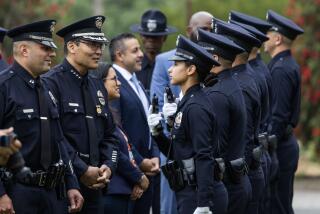Protecting Our Own
- Share via
The latest count is 388 dead and 1,897 wounded. That’s not in Iraq but on the streets of Los Angeles so far this year. Down almost 25% compared with this time last year -- that’s the good news -- the sheer number of homicides is still high enough to turn some L.A. neighborhoods into war zones. If only these areas qualified for wartime spending.
Take one relatively tiny piece of President Bush’s request for $87 billion for Iraq and Afghanistan. Included in that sum is $100 million for a witness protection program to relocate 100 Iraqi families -- to royal palaces, presumably, since that amounts to $1 million per family.
The U.S. witness protection program, by contrast, spends $10,273 on average to spirit away an ex-mobster and his family. Surely an Iraqi program could operate at least this thriftily.
California is one of a handful of states with its own program for safeguarding witnesses; the modest $3-million kitty, allocated to local district attorneys on a case-by-case basis, has survived budget cuts -- for now. Los Angeles County last year tapped the state program for $463,000 to help 511 witnesses in 194 criminal cases, 85% of which were gang- related. That comes to just $906 per witness for protection that ranges from hiring bodyguards for the trial to moving entire families out of neighborhoods ruled by gangs.
It is hard to overstate the benefit of witness protection in solving gang crimes in neighborhoods where “You snitch, you die” is more than a slogan. Los Angeles police officers, who make arrests in only about 30% of gang-related cases, know the pattern all too well: Someone is gunned down in the middle of the day, on a street or sidewalk in front of dozens of witnesses -- and no one admits to seeing or hearing anything.
Los Angeles Police Chief William J. Bratton recently commended witnesses in three recent shootings for their courage in coming forward; arrests have been made in all three cases, which is an encouraging trend. But in praising them, he pointedly did not mention the witnesses by name.
The United States can’t abandon what it started in Iraq. But it also must not abandon its own neighborhoods, whether they are struggling with overcrowded schools, inadequate housing or daily shootings by home-grown warlords.
More to Read
Sign up for Essential California
The most important California stories and recommendations in your inbox every morning.
You may occasionally receive promotional content from the Los Angeles Times.













